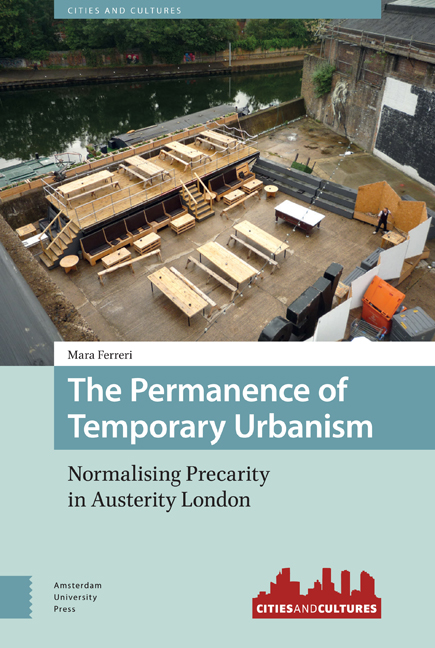4 - Staging Temporary Spaces
Published online by Cambridge University Press: 13 April 2021
Summary
Abstract This chapter analyses the performative urban experiences produced by temporary projects and their claim to publicness and openness to local communities. Through a critical discussion of the promises of ‘vibrancy’ and community engagement, it examines the importance of staging in temporary urban spaces, its co-optation and its everyday, contested performative encounters. The chapter draws extensively on participant observations of temporary projects in the Elephant and Castle shopping centre during the last decade before its final closure. The frictions between staged and unexpected urban encounters challenge the celebration of ‘use value’ as inherently beyond commodification. It reveals the need to attend carefully to local power entanglements and to the potential role of temporary uses in solidarity movements against demolition and displacement.
Keywords: experiential economies, staging, urban encounters, demolition, pop-up, Elephant and Castle
Experiential economies and the performativity of urban Activation
In April 2010, the retail magazine Shopping Centre published a series of articles on ‘more creative ways of filling vacant space’ to counter the impact of the recession on shopping malls’ occupancy in the UK. A ‘best practice’ example was the case of the Elephant and Castle Shopping Centre in south east London, where the management had encouraged art and community events within vacant units. As explained by the manager, ‘the last thing anyone wants is a barren unit. Posters are good, but what you really want is people milling around inside’. In crude but unambiguous terms, his response sums up a key experiential dimension of temporary urbanism: its performance of vibrancy and ´space activation´, intervening in perceptions of vacancy and abandonment. Beyond a merely visual transformation of the space, artistic community-oriented programming is a highly prized filler for its ability to generate social activity. In the case of the Elephant and Castle Shopping Centre, they enabled the traders—in the manager's words—to ‘capitalise on [the] sense of community and interaction’. The performance of the urban activation of vacant spaces through the staging of urban sociability is a central component of the pop-up urban imaginary. On a first reading, the verb ‘staging’ can be interpreted in an instrumental way to indicate practices of ‘immersive’ marketing developed in relation to the idea of ‘experience economy’.
- Type
- Chapter
- Information
- The Permanence of Temporary UrbanismNormalising Precarity in Austerity London, pp. 89 - 116Publisher: Amsterdam University PressPrint publication year: 2021



